

Archive of African Journals. Zuidafrikahuis Scholieren. Zuid-Afrikahuis.
Democracy. Reading List Watson Groves. A Brief History of South Africa, with Dave Steward. Ronald Segal. Ronald Segal was born into an extremely wealthy Jewish family in South Africa on 14th July 1932.
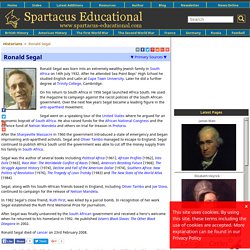
After he attended Sea Point Boys' High School he studied English and Latin at Cape Town University. Later he did a further degree at Trinity College, Cambridge. On his return to South Africa in 1956 Segal launched Africa South. He used the magazine to campaign against the racist policies of the South African government. Over the next few years Segal became a leading figure in the anti-apartheid movement. Segal went on a speaking tour of the United States where he argued for an economic boycott of South Africa. After the Sharpeville Massacre in 1960 the government introduced a state of emergency and began imprisoning anti-apartheid activists.
Segal, along with his South-African friends based in England, including Oliver Tambo and Joe Slovo, continued to campaign for the release of Nelson Mandela. In 1982 Segal's close friend, Ruth First, was killed by a parcel bomb. South Africa Exhibit - Images, Information, Primary Sources - HistoryWiz Africa. South Africa: HistoryWiz Books.
Primary Sources - African Studies & African History - LibGuides at Georgetown University. Stolten. The Making of the South African Past by Christopher Saunders. Christopher Saunders: The Making of the South African Past. 1988 Chapter 16 The Challenge Begins Source: Christopher Saunders, The Making of the South African Past, Major Historians on Race and Class;First published: in 1988 in paperback by David Philip Publishers (Pty) Ltd, Cape Town;Transcribed: by Dominic Tweedie.
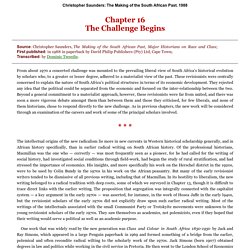
From about 1970 a concerted challenge was mounted to the prevailing liberal view of South Africa’s historical evolution by scholars who, to a greater or lesser degree, adhered to a materialist view of the past. These revisionists were centrally concerned to explain the nature of South Africa’s political structures in terms of its economic development.
They rejected any idea that the political could be separated from the economic and focused on the inter-relationship between the two. The Simonses, who settled in Lusaka, Zambia, did not make further interventions in the historiographical debate. The Revolution in South African Historiography. During the past twenty-five years, the study of South African history has undergone a transformation which, in historiographical terms, represents a revolution.
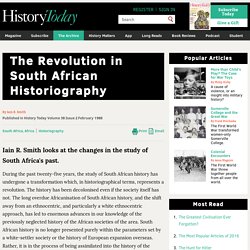
The history has been decolonised even if the society itself has not. The long overdue Africanisation of South African history, and the shift away from an ethnocentric, and particularly a white ethnocentric approach, has led to enormous advances in our knowledge of the previously neglected history of the African societies of the area. South African history is no longer presented purely within the parameters set by a white-settler society or the history of European expansion overseas. Rather, it is in the process of being assimilated into the history of the African continent. Goede Hoop. Zuid-Afrika en Nederland vanaf 1600 - Tentoonstellingen - verwacht. Nelson Mandela tijdens zijn onthaal op het Leidseplein in Amsterdam op 16 juni 1990.
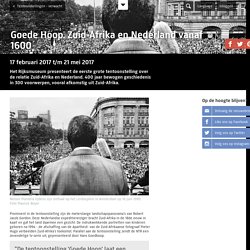
Foto Maurice Boyer Prominent in de tentoonstelling zijn de meterslange landschapspanorama’s van Robert Jacob Gordon. Deze Nederlandse expeditiereiziger bracht Zuid-Afrika in de 18de eeuw in kaart en gaf het land daarmee een gezicht. Nelson Mandela and the Netherlands. Nelson Mandela, an icon of our time, spent a long career in the South African liberation movement, the African National Congress.
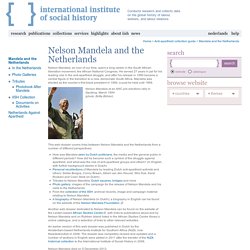
He served 27 years in jail for his leading role in the anti-apartheid struggle, and after his release in 1990 became a central figure in the transition to a new, democratic South Africa. Mandela was elected as the country’s first black president in 1994, a post he held until 1999. Nelson Mandela at an ANC pre-elections rally in Gauteng, March 1994(photo: Britta Böhler) This web dossier covers links between Nelson Mandela and the Netherlands from a number of different perspectives: How was Mandela seen by Dutch politicians, the media and the general public in different periods?
An earlier version of this web dossier was published in Dutch by the Amsterdam-based Netherlands Institute for Southern Africa (NiZA, now Niza/ActionAid) in 2006.